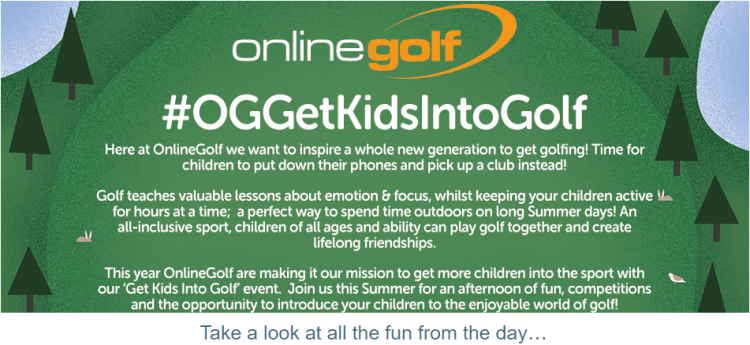Events management is a method of generating PR for your brand, combining offline experiences with online performance. Events can benefit a brand in multiple ways, from securing coverage on relevant news outlets, to reaching a new audience through social media channels. They allow you to build face-to-face relationships with potential customers whilst also generating exposure for your brand and products through media outlets. We will take you through a case study of a successful event, and how you can leverage them to enhance your digital marketing activities.
Event: Online Golf
We worked with our client Online Golf to host the first #OGGetKidsIntoGolf event for bloggers and their children. The event was set up to give parents and children a taste of golf, and to encourage children to become more active over the summer by taking part in the sport. The event also aimed to build brand awareness and generate quality links and coverage back to the Online Golf website. We researched and contacted relevant parenting bloggers, inviting them to the event. This tactic worked well for Online Golf, as the brand saw coverage in 18 online publications. From a social perspective, on the day of the event, the #OGGetKidsIntoGolf hashtag reached over 142,000 accounts and generated 546,915 impressions.

To break this down further, you need to consider the below requirements to ensure success:
Planning and logistics
When planning an event, it is essential to consider the logistical issues such as insurance and budgets, alongside how the event will be perceived through online channels. You always need to give your guests a reason to write about the event:
- Are you launching a new product?
- Have you offered an exciting activity which relates to your brand or product?
- Are you wanting to launch a new service which will benefit others?
Goals and KPIs
Before the planning stages begin, work with your events management team to define what the overall goal is. Ask yourself, why are you wanting to do this? What results are we wanting to achieve from running this event? This will inform your decision as to what kind of event you will run.
Customer profiling
Once you have outlined your overall goal, it’s important to clearly define who you want to target with this event and why you want to engage with this audience. By knowing this, it will help you to decide upon the style of event, where it should be held, the activities on the day and any goody bags or products which you are looking to give away.
Messaging
Is the message clear? Does your audience know why they are attending this event and what the brand hopes to get out of this? The Online Golf example above is the perfect case study to highlight the importance of setting a clear message for the event. The team at Online Golf wanted to encourage children to get into golf from a young age, and lots of the online coverage highlighted this key message.
Content
Creating a strong piece of content for your site is a great way to look to secure links post-event. This could include a roundup of the day, a landing page full of images from the event, a video, or a how-to guide; something which can be used to inform, entertain or engage the reader would be a perfect choice in order to encourage guests to feature the event and ultimately link back to your website. Here is an example from the Online Golf event:
Promotion
A strong promotion plan is crucial for an event’s success. Whether you look to do this via email outreach, a newsletter or social media, continual promotion throughout this process is the key to ensuring you secure the results you are aiming for.
How we can help
Events management is an effective PR method that works within multiple industries targeting a mix of different customers. Are you interested in events management for your brand? Contact us to find out more about how we can help you improve your online performance.


